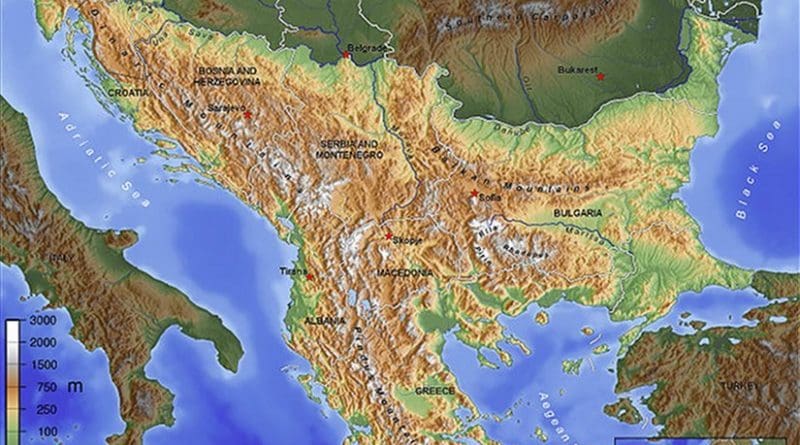EU Raps Balkan States Over War Crimes Progress
By Marija Ristic
The annual EU progress reports for Bosnia and Herzegovina, Serbia and Kosovo, published on Wednesday, said that the three Balkan countries still need to do more to deal with the crimes committed during the wars of the 1990s and their enduring impact.
Serbia is criticised for not cooperating properly with the International Criminal Tribunal for the Former Yugoslavia and extraditing three wanted members of the nationalist Serbian Radical Party to The Hague.
In Kosovo, it warns that local war crimes prosecutors and police could be under-resourced and under-skilled.
It also expresses continued concerns about the huge backlog of unprocessed war crimes cases in Bosnia and Herzegovina.
Overall, the unresolved fate of close to 11,000 people who disappeared during the conflicts of the 1990s remains a humanitarian concern, the reports say.
Of these, some 6,900 cases are related to the conflict in Bosnia and Herzegovina, 2,100 to the conflict in Croatia and over 1,600 to the conflict in Kosovo, according to figures from International Committee of the Red Cross.
“The lack of information on gravesites and difficulties in identifying the human remains exhumed up to now continue to be the key obstacles to solving the remaining cases of missing persons in the region,” the EU says.
Serbia chided for not extraditing Radicals
The report said that it was a serious concern that Serbia had turned away from full cooperation with the International Criminal Tribunal for the Former Yugoslavia in The Hague.
The criticism stems from Serbia’s refusal to hand over of three members of the Serbian Radical Party who are wanted for contempt of court for allegedly interfering with witnesses in their leader Vojislav Seselj’s trial.
The report says that Serbia needs to implement the ICTY’s rulings and decisions fully.
“Serbia’s commitment to working towards regional cooperation and reconciliation should include preparedness to face its recent past and to do all it can to establish an atmosphere conducive to deal with all war crimes,” it adds.
It describes the adoption in February 2016 of a national strategy for the investigation and prosecution of war crimes as an “important step forward”, but urges Serbia to step up the implementation of the strategy and adopt an operational prosecutorial strategy.
The report welcomes the fact that the Serbian War Crime Prosecutor’s Office has continued its cooperation with other countries in the region to exchange evidence and information.
“The most significant developments concern the number of cases referred to prosecution services in Bosnia and Herzegovina (16 cases) and Croatia (44 cases),” it notes.
But it expresses serious concern that the mandate of the former War Crimes Prosecutor expired in December 2015 and his successor has yet to be appointed.
It also notes that only two new war crimes indictments were filed in 2015 and there was no progress on investigating high-profile cases.
Kosovo war crimes unit under pressure
The EU report warns that although Kosovo has set up a war crimes department within its Special Prosecution Office, it only has two local prosecutors for a workload which will further increase when more cases are handed over from the EU rule-of-law mission, EULEX.
The Kosovo police war crimes investigation unit has been given additional staff, vehicles and computers, but lacks qualified personnel, it says.
“The limited experience, and the lack of investigators with an ethnic Serb background, criminal intelligence analysis staff and language and translation capacity, has an impact on the work of the unit,” it cautions.
In cases where the suspects are ethnic Serbs, mainly living in Serbia, mutual legal cooperation between Pristina and Belgrade is effectively non-existent, it says.
It also expresses concern about Pristina’s capacity and willingness to handle war crimes cases involving former Kosovo Liberation Army members.
The 1,665 people who have been missing since the conflict is another major issue for Kosovo, the report says.
“The unresolved fate of missing persons from the 1990s conflict remains a humanitarian concern, the resolution of which is vital for reconciliation and stability in the region,” it explains.
“Politicisation of the process, including unhelpful statements in the media and a further weakening of the process due to interinstitutional disputes, needs to be avoided,” it adds.
The Kosovo government must “show greater political commitment and renewed efforts” to find missing persons, it argues, saying that a central register of missing persons should be established.
It also expresses concern about the lack of progress in dealing with unidentified human remains stored at the Pristina morgue.
However the report notes that Kosovo met its obligations in relation to the establishment of the new Hague-based Specialist Chambers and Specialist Prosecution Office which will probe and try allegations of crimes committed by KLA fighters during and after the 1999 conflict.
Bosnia: large backlog of cases remains
The report says that Bosnia and Herzegovina “further tackled” its huge backlog of war crimes prosecutions, with an increase in indictments between September 2015 and August 2016.
“There was a continued positive trend in the successful prosecution of war crimes cases involving sexual violence. Final convictions amounted to 25 cases,” the report says.
However it cautions that a large number of potential cases remain and more efforts are required, “particularly to ensure institutional understanding to improve victims’ confidence in the judicial system and avoid retraumatisation of victims and witnesses”.
It expresses further concern that female war victims of the war do not have the same legal status in Bosnia’s two entities, Republika Srpska and the Federation.
It says that the implementation of the country’s national war crimes strategy objectives continued, with less complex cases being transferred from the state-level judiciary to lower judicial levels, but warns that Bosnia and Herzegovina is still behind schedule in processing the more complex cases.
“The initial deadline of seven years to have the most complex cases solved by December 2015 was not met and a new revised deadline has yet to be agreed,” it says.

